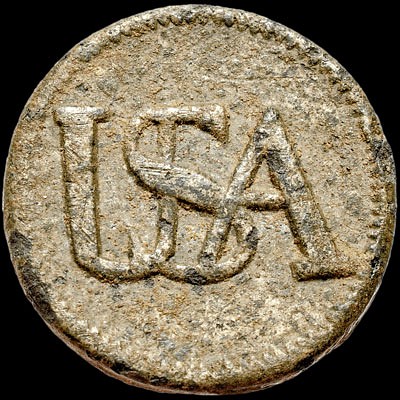1883 JOHN T FORD Document Signed, Abe Lincoln Assasination Fords Theater Manager
Lot 10
Estimate:
$800 - $1,000
Absentee vs Live bid
Two ways to bid:
- Leave a max absentee bid and the platform will bid on your behalf up to your maximum bid during the live auction.
- Bid live during the auction and your bids will be submitted real-time to the auctioneer.
Bid Increments
| Price | Bid Increment |
|---|---|
| $0 | $10 |
| $200 | $20 |
| $300 | $25 |
| $500 | $50 |
| $1,000 | $100 |
| $2,000 | $200 |
| $3,000 | $250 |
| $5,000 | $500 |
| $10,000 | $1,000 |
| $20,000 | $2,000 |
| $30,000 | $2,500 |
| $50,000 | $5,000 |
| $100,000 | $10,000 |
| $200,000 | $20,000 |
| $300,000 | $25,000 |
| $500,000 | $50,000 |
About Auction
By Early American History Auctions
Aug 21, 2021
Set Reminder
2021-08-21 12:00:00
2021-08-21 12:00:00
America/New_York
Bidsquare
Bidsquare : Autographs - Historic & Political Americana - Militaria & Guns
https://www.bidsquare.com/auctions/early-american-history-auctions/autographs---historic-political-americana---militaria-guns-7321
335 Lots of Rare, Historic Autographs, Americana, Civil War Era, George Washington, Revolutionary War Era, Colonial America, Federal Period, War of 1812, Colonial Currency & more... Early American History Auctions auctions@earlyamerican.com
335 Lots of Rare, Historic Autographs, Americana, Civil War Era, George Washington, Revolutionary War Era, Colonial America, Federal Period, War of 1812, Colonial Currency & more... Early American History Auctions auctions@earlyamerican.com
- Lot Description
Autographs
John T. Ford of "FORD'S THEATER" Document Signed
JOHN THOMPSON FORD (1829-1894). The successful American theater manager notable for operating Ford's Theatre and the Manager of "Ford's Theater" where President Abraham Lincoln was Assassinated by actor John Wilkes Booth on the evening of April 14, 1865. Ford was also a good friend of Lincoln's assassin John Wilkes Booth.
July 26, 1883-Dated, Partially-Printed Invoice with Autograph Endorsement Signed, "J. T. Ford," at Baltimore, MD, 1 page, measuring 7" x 8.25", Very Fine. This invoice has been printed on pictorial stationery of Coolahan & Evans, Furnishing Undertakers, for $87.00 for, "Funeral Expenses of Miss Mary McGinn". At the lower left is an Autograph Note Signed: "Wm. E. Starn - Corpus Christie". The "Undertaker's" Document reads, in full: "To Mr. Jno. T. Ford, City Hall, This bill is for the funeral of one of the victims at Tivoli. ($50)" Beneath this, Ford has penned: "The City will pay $50 on account of this bill." Part of Ford's handwriting is somewhat dampstained and along the left portion of the "J" of the signature. A wonderful Funeral House "stagecoach" period vignette is displayed at the upper left.
John Thompson Ford (April 16, 1829-March 14, 1894) was an American theater manager and politician during the nineteenth century. He is most notable for operating Ford's Theatre at the time of the Abraham Lincoln assassination on the night of April 14th, 1865 by actor John Wilkes Booth.
Ford was born in Baltimore, Maryland, and was the son of Elias and Anna (ne Greanor) Ford. His ancestors were early Maryland settlers and some of them took part in the American Revolution. For a few years he attended public school in Baltimore and then became a clerk in his uncle's tobacco factory in Richmond, Virginia. Not caring for this work, he became a bookseller. In 1858, Mr. Ford was elected President of the City Council of Baltimore, and by a force of circumstance was acting mayor for two years. He also was in the position of City Director, for one term, of the Baltimore and Ohio Railroad.
Working as a bookseller in Richmond, Ford then wrote a farce dealing with contemporary life. The farce was entitled Richmond As It Is, and was produced by a minstrel company called the Nightingale Serenaders. This farce was fairly successful, and George Kunkel, the owner and manager of the Serenaders, offered Ford a position with the organization. He accepted, and for several seasons traveled as business manager of this company throughout the United States and Canada.
In 1854, Ford assumed control of the Holliday Street Theater, Baltimore, which he managed for twenty-five years. Later, he built the Grand Opera House in that city in 1871.
Ford also was responsible for creating three theaters in Washington, D.C. He opened his first theatre on Tenth Street in 1861. After it was destroyed by fire the following year, he rebuilt the structure on the same site and called it Ford's Theatre.
Ford was the manager of this highly successful theatre at the time of the assassination of President Abraham Lincoln. He was a good friend of Lincoln's assassin John Wilkes Booth, a famous actor. Ford drew further suspicion upon himself by being in Richmond, Virginia, at the time of the assassination on April 14, 1865. Until April 2, 1865, Richmond had been the capital of the Confederate States of America and a center of anti-Lincoln conspiracies.
An order was issued for Ford's arrest and on April 18, he was arrested at his Baltimore home. His brothers James and Harry Clay Ford were thrown into prison along with him. John Ford complained of the effect that his incarceration would have on his business and family, and he offered to help with the investigation, but Secretary of War Edwin M. Stanton made no reply to his two letters.
After 39 days, the brothers were finally fully exonerated and set free since there was no evidence of their complicity in the crime.
The theater was seized by the government, and Ford was paid $88,000 for it by Congress. The treatment accorded to him following the assassination made him remain bitter toward the US government for decades.
- Shipping Info
-
Early American provides in-house worldwide shipping. Please contact us directly if you have questions about your specific shipping requirements.
-
- Buyer's Premium



 EUR
EUR CAD
CAD AUD
AUD GBP
GBP MXN
MXN HKD
HKD CNY
CNY MYR
MYR SEK
SEK SGD
SGD CHF
CHF THB
THB













